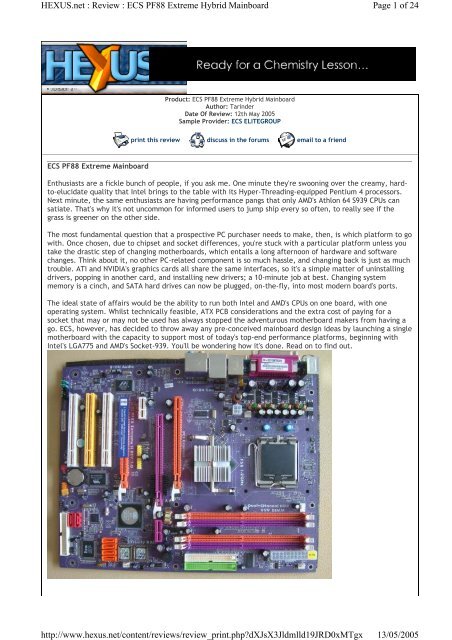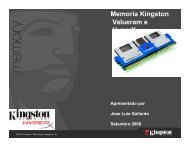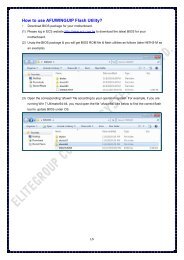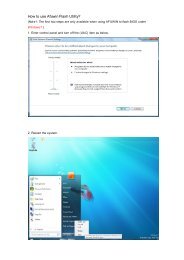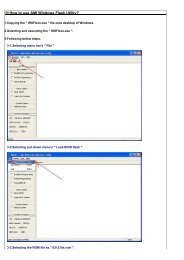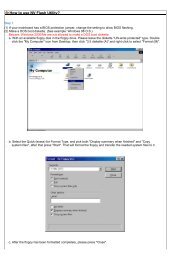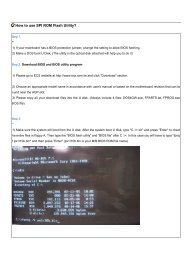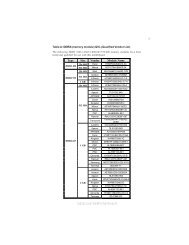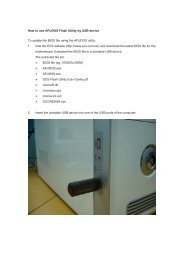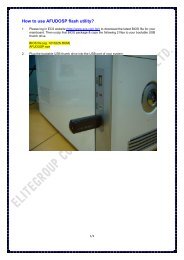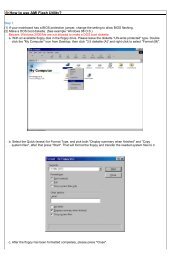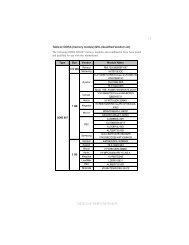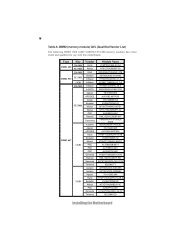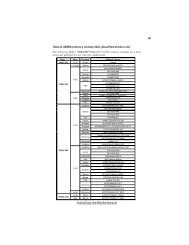Page 1 of 24 HEXUS.net : Review : ECS PF88 Extreme Hybrid ...
Page 1 of 24 HEXUS.net : Review : ECS PF88 Extreme Hybrid ...
Page 1 of 24 HEXUS.net : Review : ECS PF88 Extreme Hybrid ...
You also want an ePaper? Increase the reach of your titles
YUMPU automatically turns print PDFs into web optimized ePapers that Google loves.
<strong>HEXUS</strong>.<strong>net</strong> : <strong>Review</strong> : <strong>ECS</strong> <strong>PF88</strong> <strong>Extreme</strong> <strong>Hybrid</strong> Mainboard<br />
<strong>ECS</strong> <strong>PF88</strong> <strong>Extreme</strong> Mainboard<br />
Product: <strong>ECS</strong> <strong>PF88</strong> <strong>Extreme</strong> <strong>Hybrid</strong> Mainboard<br />
Author: Tarinder<br />
Date Of <strong>Review</strong>: 12th May 2005<br />
Sample Provider: <strong>ECS</strong> ELITEGROUP<br />
print this review discuss in the forums email to a friend<br />
<strong>Page</strong> 1 <strong>of</strong> <strong>24</strong><br />
Enthusiasts are a fickle bunch <strong>of</strong> people, if you ask me. One minute they're swooning over the creamy, hardto-elucidate<br />
quality that Intel brings to the table with its Hyper-Threading-equipped Pentium 4 processors.<br />
Next minute, the same enthusiasts are having performance pangs that only AMD's Athlon 64 S939 CPUs can<br />
satiate. That's why it's not uncommon for informed users to jump ship every so <strong>of</strong>ten, to really see if the<br />
grass is greener on the other side.<br />
The most fundamental question that a prospective PC purchaser needs to make, then, is which platform to go<br />
with. Once chosen, due to chipset and socket differences, you're stuck with a particular platform unless you<br />
take the drastic step <strong>of</strong> changing motherboards, which entails a long afternoon <strong>of</strong> hardware and s<strong>of</strong>tware<br />
changes. Think about it, no other PC-related component is so much hassle, and changing back is just as much<br />
trouble. ATI and NVIDIA's graphics cards all share the same interfaces, so it's a simple matter <strong>of</strong> uninstalling<br />
drivers, popping in another card, and installing new drivers; a 10-minute job at best. Changing system<br />
memory is a cinch, and SATA hard drives can now be plugged, on-the-fly, into most modern board's ports.<br />
The ideal state <strong>of</strong> affairs would be the ability to run both Intel and AMD's CPUs on one board, with one<br />
operating system. Whilst technically feasible, ATX PCB considerations and the extra cost <strong>of</strong> paying for a<br />
socket that may or may not be used has always stopped the adventurous motherboard makers from having a<br />
go. <strong>ECS</strong>, however, has decided to throw away any pre-conceived mainboard design ideas by launching a single<br />
motherboard with the capacity to support most <strong>of</strong> today's top-end performance platforms, beginning with<br />
Intel's LGA775 and AMD's Socket-939. You'll be wondering how it's done. Read on to find out.<br />
http://www.hexus.<strong>net</strong>/content/reviews/review_print.php?dXJsX3Jldmlld19JRD0xMTgx<br />
13/05/2005
<strong>HEXUS</strong>.<strong>net</strong> : <strong>Review</strong> : <strong>ECS</strong> <strong>PF88</strong> <strong>Extreme</strong> <strong>Hybrid</strong> Mainboard<br />
<strong>Page</strong> 2 <strong>of</strong> <strong>24</strong><br />
Take a few seconds to ponder the <strong>ECS</strong> <strong>PF88</strong> <strong>Extreme</strong>'s layout. For all intents and purposes, barring the extralong<br />
connector (hint, hint) running through the middle <strong>of</strong> the board, it's a regular LGA775-supporting board. In<br />
fact, with 2 x16 PCI-Express slots you'd be forgiven for thinking it's <strong>ECS</strong>' take on Intel-based SLI, but, as you<br />
may have guessed, the second, orange-coloured PCI-Express x16 slot is reserved for something else. Can you<br />
figure it out?<br />
I'll discuss the merits <strong>of</strong> this standalone motherboard before detailing just how it can be transformed into a<br />
S939 board. In its basic form, then, the <strong>PF88</strong> <strong>Extreme</strong> is a SiS chipset-powered PCI-Express LGA775<br />
mainboard, with a SiS656 northbridge and SiS965 southbridge, linked together via a 1GB/s interconnect.<br />
There's plenty <strong>of</strong> room around the socket area, and it makes for easy mounting <strong>of</strong> Intel's fiddly LGA775<br />
reference coolers. What's more, unlike Intel, the SiS656 supports the newest iteration <strong>of</strong> dual-core Pentium<br />
CPUs immediately.<br />
LGA775's designed to run with DDR2 memory in mind. The <strong>PF88</strong> <strong>Extreme</strong> carries the usual 4 DIMM slots that<br />
<strong>of</strong>fer dual-channel bandwidth by populating same-coloured slots (or all 4, for that matter). Right <strong>of</strong>f the bat,<br />
the <strong>PF88</strong>'s SiS656 northbridge, located just to the left <strong>of</strong> the CPU socket, supports dual-channel DDR2-533 and<br />
DDR2-667, bringing it in line with Intel's i9xx models. The northbridge also supports the first orange-coloured<br />
PCI-Express x16 slot, just to the left. Unlike most retail Intel 925-series, however, <strong>ECS</strong>/SiS implement 2 IDE<br />
ATA133 ports, great if you're still using a bunch <strong>of</strong> older hard drives and/or optical devices. A <strong>24</strong>-pin EPS 12v<br />
power connector is also something that we see on the majority <strong>of</strong> Intel boards. Indeed, thus far, and not<br />
looking to the left, this could quite easily be another generic i925XE we're reviewing.<br />
http://www.hexus.<strong>net</strong>/content/reviews/review_print.php?dXJsX3Jldmlld19JRD0xMTgx<br />
13/05/2005
<strong>HEXUS</strong>.<strong>net</strong> : <strong>Review</strong> : <strong>ECS</strong> <strong>PF88</strong> <strong>Extreme</strong> <strong>Hybrid</strong> Mainboard<br />
<strong>Page</strong> 3 <strong>of</strong> <strong>24</strong><br />
Coming on down the board and steadfastedly ignoring the two BIOS chips (another hint), the SiS965<br />
southbridge is a solid companion to the PCI-Express SiS656 northbridge. SiS integrates 4 independent SATA<br />
ports that can be setup in RAID 0, 1, 0+1, and JBOD configurations. Further, continuing the PCI-Express<br />
theme, it supports 2 x1 lanes. Amongst other notables, the '965 features 8-channel sound, albeit only AC'97, 8<br />
USB2.0 ports, 6 PCI slots, and a Gigabit Ether<strong>net</strong> MAC. SiS also has another southbridge, imaginatively titled<br />
SiS966, that supports high-definition audio, and it may well be included in a board revision.<br />
More SATA goodness is to be found via the use <strong>of</strong> Silicon Image's Sil3132 controller. As the name implies, it<br />
supports 2 ports, red on the <strong>PF88</strong> <strong>Extreme</strong>, and rides <strong>of</strong>f the preferred x1 PCI-Express lane. I've bemoaned the<br />
lack <strong>of</strong> PCI-Express peripherals in the past, so it's nice to see <strong>ECS</strong> specify it instead <strong>of</strong> a regular PCI-based<br />
3112. It also gains points by supporting SATA2, and by consequence, Native Command Queuing (not present in<br />
SiS965). S<strong>of</strong>tware RAID 0 and RAID 1 are also available, as is RAID 5 and RAID 10 if run with the optional port<br />
multiplier.<br />
Other feature goodies include 2-port FireWire (VIA6307), 3 PCI slots, 8-channel sound routed through Realtek's<br />
trusty ALC850 CODEC, and a Marvell physical layer that serves as another routing device for the SiS965's<br />
Gigabit Ether<strong>net</strong> MAC.<br />
The I/O section reflects the feature-set well. There's 4 USB2.0 (another 4 available via on-board headers), a<br />
single FireWire 1394a port, RJ-45 for Gigabit Ether<strong>net</strong>, 2 Serial ports, and 6 speaker ports that combine to<br />
<strong>of</strong>fer 8-channel sound. Given the <strong>PF88</strong> <strong>Extreme</strong>'s aggressive pricing <strong>of</strong> only £65 including VAT and the decent<br />
feature-set and layout on <strong>of</strong>fer, <strong>ECS</strong> would already be on to a winner. But there's more, oh so much more to<br />
it. Remember the purple-coloured slot and the second PCI-Express x16 slots from the previous page? It's kind<br />
http://www.hexus.<strong>net</strong>/content/reviews/review_print.php?dXJsX3Jldmlld19JRD0xMTgx<br />
13/05/2005
<strong>HEXUS</strong>.<strong>net</strong> : <strong>Review</strong> : <strong>ECS</strong> <strong>PF88</strong> <strong>Extreme</strong> <strong>Hybrid</strong> Mainboard<br />
<strong>of</strong> hard to miss them. That's how, in essence, <strong>ECS</strong> is able to turn the <strong>PF88</strong> <strong>Extreme</strong> from an Intel-only<br />
mainboard into, at the moment, a S939 AMD Athlon 64-supporting board.<br />
Bought separately for just over £30 including VAT, <strong>ECS</strong> <strong>of</strong>fers its SIMA platform converter card, the A9S.<br />
<strong>Page</strong> 4 <strong>of</strong> <strong>24</strong><br />
And there you have it. An add-in card that fits into the purple-coloured Elite Bus connector on the <strong>PF88</strong><br />
<strong>Extreme</strong>. The A9S supports all current Socket-939 CPUs and will also run dual-core X2s with a BIOS update.<br />
Power-delivery circuits and a 4-pin cable (that you remove from the mainboard and attach here) give the card<br />
the necessary power stability and juice. 2 DDR1 slots <strong>of</strong>fer up to 2GB <strong>of</strong> system RAM that's run in dual-channel<br />
mode. <strong>ECS</strong> has chosen to go with incompatible DDR1 and DDR2 for AMD and Intel, respectively. It could have<br />
engineered the <strong>PF88</strong> <strong>Extreme</strong> to run with LGA775 and DDR1, much like Intel's i915x chipsets. That would have<br />
eased the financial burden <strong>of</strong> switching over to AMD, as now you have to invest in not only a CPU but also in<br />
DDR1 RAM. <strong>ECS</strong> has tried to strike a balance between future-pro<strong>of</strong>ing LGA775, which is supported at 266MHz<br />
FSB and will rise in the future, and present DDR400 support for AMD's S939 CPUs. Given a choice, I'd liked to<br />
have seen DDR1 implemented on both sides. It would then have simply been a matter <strong>of</strong> purchasing the A9S<br />
and the S939 CPU <strong>of</strong> your choice.<br />
http://www.hexus.<strong>net</strong>/content/reviews/review_print.php?dXJsX3Jldmlld19JRD0xMTgx<br />
13/05/2005
<strong>HEXUS</strong>.<strong>net</strong> : <strong>Review</strong> : <strong>ECS</strong> <strong>PF88</strong> <strong>Extreme</strong> <strong>Hybrid</strong> Mainboard<br />
<strong>Page</strong> 5 <strong>of</strong> <strong>24</strong><br />
<strong>ECS</strong> has used a SiS756 PCI-Express-compatible northbridge on the convertor card. There's very good, practical<br />
reasons for it, too. It carries the dual-channel DDR400 memory controller which connects up to the DIMM slots<br />
mentioned above. Being PCI-Express, it also feeds down to the second orange-coloured x16 slot on the<br />
motherboard. The first, used in an Intel-based setup, can't be accessed as the convertor card blocks the slot<br />
completely. Even if it could, it's mapped out for the SiS656 northbridge. In a conventional AMD S939 setup,<br />
the SiS756 is usually paired with the '965 southbridge; exactly the same southbridge that's already featured<br />
here. The convertor card, once positioned in the Elite Bus slot and activated by removing a bank <strong>of</strong> jumpers,<br />
disables the SiS656-SiS965 interconnect and forces the <strong>PF88</strong> <strong>Extreme</strong> to run with the AMD-designed SiS756-<br />
SiS965 combination, again through a 1GB/s interconnect. Having said that, power is still being delivered to<br />
the LGA775 northbridge.<br />
The space constraints <strong>of</strong> locating both an Athlon 64 socket and 2 DIMM slots are manifested in the inability to<br />
run a reference, PIB cooler that's shipped with high-end S939 CPUs. Note how, using Crucial Ballistix RAM, the<br />
first DIMM slot is blocked <strong>of</strong>f, thereby inadvertently disabling dual-channel memory.<br />
http://www.hexus.<strong>net</strong>/content/reviews/review_print.php?dXJsX3Jldmlld19JRD0xMTgx<br />
13/05/2005
<strong>HEXUS</strong>.<strong>net</strong> : <strong>Review</strong> : <strong>ECS</strong> <strong>PF88</strong> <strong>Extreme</strong> <strong>Hybrid</strong> Mainboard<br />
<strong>Page</strong> 6 <strong>of</strong> <strong>24</strong><br />
Installing an older AMD reference cooler or appropriate aftermarket heatsink cures the problem. A couple <strong>of</strong><br />
Corsair XMS3200XL sticks have just enough room to breathe.<br />
Look back to the previous page and you'll just be able to make out a two rows <strong>of</strong> black jumpers between the<br />
first PCI-Express x16 slot and the Elite Bus connector. These need to be removed when engaging the A9S addin<br />
SIMA card. What you get is........<br />
http://www.hexus.<strong>net</strong>/content/reviews/review_print.php?dXJsX3Jldmlld19JRD0xMTgx<br />
13/05/2005
<strong>HEXUS</strong>.<strong>net</strong> : <strong>Review</strong> : <strong>ECS</strong> <strong>PF88</strong> <strong>Extreme</strong> <strong>Hybrid</strong> Mainboard<br />
<strong>Page</strong> 7 <strong>of</strong> <strong>24</strong><br />
Note how the A9S card and AMD cooler then block the access path to the first PCI-Express slot?. That's one<br />
reason why there's a second one behind.<br />
The A9S card is also the reason why there's 2 BIOS chips on the board. One for Intel and one for AMD. Once<br />
the convertor card is plugged in correctly, the board switches the BIOS to AMD's. The <strong>PF88</strong> <strong>Extreme</strong> ships with<br />
just the Intel chip in place, and AMD's is supplied with the A9S card.<br />
http://www.hexus.<strong>net</strong>/content/reviews/review_print.php?dXJsX3Jldmlld19JRD0xMTgx<br />
13/05/2005
<strong>HEXUS</strong>.<strong>net</strong> : <strong>Review</strong> : <strong>ECS</strong> <strong>PF88</strong> <strong>Extreme</strong> <strong>Hybrid</strong> Mainboard<br />
<strong>Page</strong> 8 <strong>of</strong> <strong>24</strong><br />
Once installed, the PCI-Express card is moved to the left. With an ATI RADEON X850 XT PE 256MB in situ one<br />
niggly problem arose. Accessing the clear CMOS jumper, which is on the far left, with the motherboard in a<br />
regular CoolerMaster WaveMaster case, is frustratingly difficult without removing the card. <strong>ECS</strong> should also<br />
have used a big-headed jumper, found primarily on ABIT boards.<br />
The same setup with an Intel CPU, cooler and DDR2 RAM in place. Much cleaner, but that's kind <strong>of</strong> obvious,<br />
isn't it?<br />
http://www.hexus.<strong>net</strong>/content/reviews/review_print.php?dXJsX3Jldmlld19JRD0xMTgx<br />
13/05/2005
<strong>HEXUS</strong>.<strong>net</strong> : <strong>Review</strong> : <strong>ECS</strong> <strong>PF88</strong> <strong>Extreme</strong> <strong>Hybrid</strong> Mainboard<br />
<strong>ECS</strong> hasn't skimped on board features or packaging. The <strong>PF88</strong> <strong>Extreme</strong> arrives in an oversized box that's<br />
replete with goodies.<br />
<strong>Page</strong> 9 <strong>of</strong> <strong>24</strong><br />
<strong>ECS</strong> bundles in a multi-purpose bracket that adds in 2 USB2.0 and a single 6-pin FireWire port. There's also a<br />
foot-long eSATA cable, designed to be used with Silicon Image's 3132 controller, attached to the back <strong>of</strong> a<br />
case, and provide on-the-fly connectivity to external SATA hard drives, usually in enclosures and powered<br />
from the mains. 4 orange-coloured SATA cables and black IDE/floppy cables are a nice touch. There's also a<br />
custom I/O shield, molex-to-SATA power connectors, and a decent manual, with colour illustrations, written<br />
in good English. I also liked the fact that <strong>ECS</strong> provided a one-touch s<strong>of</strong>tware installation CD, which took care<br />
<strong>of</strong> many <strong>of</strong> the board's drivers without the need to install each one manually. On the s<strong>of</strong>tware front, <strong>ECS</strong> adds<br />
in InterVideo's WinDVD 5, WinDVD Creator, WinRip 2. Pro Magic Plus, a Ghost-like app., ShowShifter, another<br />
media-related application, and InTouch, a remote-accessing tool, complete the bundle.<br />
http://www.hexus.<strong>net</strong>/content/reviews/review_print.php?dXJsX3Jldmlld19JRD0xMTgx<br />
13/05/2005
<strong>HEXUS</strong>.<strong>net</strong> : <strong>Review</strong> : <strong>ECS</strong> <strong>PF88</strong> <strong>Extreme</strong> <strong>Hybrid</strong> Mainboard<br />
The <strong>PF88</strong> <strong>Extreme</strong> arrives in two flavours. One is the regular bundle, as seen above. The other includes WiFi<br />
support through a USB extender and 802.11g dongle; handy for gaining a better signal than having the dongle<br />
plugged into the back. Pricing for the standalone <strong>PF88</strong> <strong>Extreme</strong> is £65 including VAT for the regular bundle<br />
and around £80 including VAT for the WiFi-equipped version. You could add 50% to those prices if the board<br />
had, say, ASUS' name on and not <strong>ECS</strong>'. A decent bundle to go along with a well-featured board.The <strong>ECS</strong> <strong>PF88</strong><br />
<strong>Extreme</strong>'s BIOS is a unique setup in that it has to cater for both Intel and AMD CPUs. When using either brand<br />
<strong>of</strong> CPU and appropriate BIOS, we see the following Phoenix AwardBIOS page.<br />
With respect to Intel CPUs, let's trundle on over to the frequency/voltage section first.<br />
http://www.hexus.<strong>net</strong>/content/reviews/review_print.php?dXJsX3Jldmlld19JRD0xMTgx<br />
<strong>Page</strong> 10 <strong>of</strong> <strong>24</strong><br />
13/05/2005
<strong>HEXUS</strong>.<strong>net</strong> : <strong>Review</strong> : <strong>ECS</strong> <strong>PF88</strong> <strong>Extreme</strong> <strong>Hybrid</strong> Mainboard<br />
<strong>Page</strong> 11 <strong>of</strong> <strong>24</strong><br />
CPU ratio only presents itself when using unlocked/engineering sample Intel-based processors. I found it<br />
impossible to run with anything other than the default multiplier. More <strong>of</strong> an early BIOS issue than anything<br />
else. CPU Front-Side Bus can be set, with respect to a 200MHz FSB CPU, to anything between default and<br />
450MHz. Further, the PCI bus can be locked to ensure that peripherals don't hinder overclocking efforts. PCI-<br />
Express speeds aren't expressly stated, though. CPU-to-DRAM ratios need to be doubled in order to correspond<br />
to what we're used to with other boards. For example, most i925XE's can be set to DDR533 using a 3:4 ratio.<br />
<strong>ECS</strong>, however, states DRAM frequency in DDR terms, so the same setting is achieved via a 3:8 ratio. Others<br />
available are SPD, 3:4 (DDR266), 3:5 (DDR333), 1:2 (DDR400), and 3:10 (DDR667, or SPD in the case <strong>of</strong> Crucial<br />
Ballistix DDR2 PC5400 RAM). <strong>ECS</strong> also <strong>of</strong>fers up to 0.075v extra juice for the CPU and 0.15v extra for DDR2. I'd<br />
liked to have seen extra adjustment on both lines, really.<br />
Intel-based DRAM control was best left at default settings, which translated into 4-4-4-12 timings at DDR533<br />
speeds.<br />
http://www.hexus.<strong>net</strong>/content/reviews/review_print.php?dXJsX3Jldmlld19JRD0xMTgx<br />
13/05/2005
<strong>HEXUS</strong>.<strong>net</strong> : <strong>Review</strong> : <strong>ECS</strong> <strong>PF88</strong> <strong>Extreme</strong> <strong>Hybrid</strong> Mainboard<br />
A relatively low 12v line didn't impact upon board stability in any way. Voltages were consistent as any other<br />
board's, too.<br />
AMD BIOS<br />
<strong>Page</strong> 12 <strong>of</strong> <strong>24</strong><br />
It will come as no surprise that the <strong>PF88</strong> <strong>Extreme</strong> uses a second BIOS that's used in conjunction with the A9S<br />
add-in, AMD-supporting card. Firing up the board with card, CPU and DDR1 in place shows, expectedly, a BIOS<br />
geared up towards S939 CPUs.<br />
Note the lack <strong>of</strong> parameter adjustment compared to the Intel's. There's no CPU or DDR voltage manipulation,<br />
although that may appear in later BIOSes. It's probably a sensible approach by <strong>ECS</strong>, given that AMD S939 CPUs<br />
are run <strong>of</strong>f an additional card and not the motherboard itself. FSB frequencies range from 200MHz-232MHz, so<br />
it's not aimed at the enthusiast, either.<br />
http://www.hexus.<strong>net</strong>/content/reviews/review_print.php?dXJsX3Jldmlld19JRD0xMTgx<br />
13/05/2005
<strong>HEXUS</strong>.<strong>net</strong> : <strong>Review</strong> : <strong>ECS</strong> <strong>PF88</strong> <strong>Extreme</strong> <strong>Hybrid</strong> Mainboard<br />
There's a reasonable degree <strong>of</strong> DDR parameter adjustment. Running with a couple 512MB Corsair's XMS3200XL<br />
sticks and leaving the settings on auto gave SPD timings <strong>of</strong> 2-2-2-5 1T, perfect for low-latency accesses.<br />
Using an original S939 cooler pushed up an FX-53's BIOS CPU temperature to 55c. Windows' load hovered at<br />
around 63c. Hot but not hot enough to prejudice results in any way. Heat is something that <strong>ECS</strong> will need to<br />
keep a close eye upon, especially when running with FX-55 or dual-core CPUs. The odd socket positioning,<br />
relative to most motherboards', didn't impact upon stability at all.<br />
Motherboard <strong>ECS</strong> <strong>PF88</strong> <strong>Extreme</strong><br />
CPU Support All LGA775 processors (including dual-core models)<br />
Northbridge SiS656<br />
Memory Support 4 slots, DDR-II only. Supports DDR2-400MHz, 533MHz, and 667MHz at 200MHz FSB. 4GB m<br />
AGP None<br />
PEG 2x x16 from SiS656/756<br />
Southbridge SiS965<br />
Audio 8-channel feed from SiS965 to Realtek ALC850 CODEC<br />
Audio Connectivity 6-port backplane speaker<br />
PCI 1x 32-bit 33MHz PCI 2.1 slots<br />
PCI Express 1x x1 slots<br />
IDE 2 ATA133 compliant ports from SiS965<br />
IDE RAID None<br />
SATA 4 ports from SiS965<br />
SATA RAID RAID0, 1, 0+1, and JBOD from SiS965<br />
SATA RAID #2 RAID0 and RAID1 from Silicon Image Sil3132 PCI-Express-based controller. SATA2 complia<br />
Networking Gigabit Ether<strong>net</strong> MAC controller on SiS965 via Marvell 88E1111 PHY<br />
USB 8 USB2.0 ports from SiS965. 4x backplane USB2.0 and 4x internal I/O USB2.0<br />
FireWire 2-port 1394a FireWire support from VIA VT6307 ASIC<br />
Other I/O PS/2, Parallel, 2x Serial<br />
Onboard connectors and pin headers Floppy, 2x ATA133, 4x USB2.0, 6x SATA, FireWire 1394a, Elite Bus connector, 3x usable<br />
Form Factor 305mm x <strong>24</strong>5mm, ATX<br />
Expected price £65 inc. VAT. £31 for SIMA card<br />
The strangest set <strong>of</strong> features yet!<br />
Hardware and S<strong>of</strong>tware<br />
Test Platforms<br />
<strong>Page</strong> 13 <strong>of</strong> <strong>24</strong><br />
System <strong>ECS</strong> <strong>PF88</strong> <strong>Extreme</strong> System Intel i925XE system A<br />
http://www.hexus.<strong>net</strong>/content/reviews/review_print.php?dXJsX3Jldmlld19JRD0xMTgx<br />
13/05/2005
<strong>HEXUS</strong>.<strong>net</strong> : <strong>Review</strong> : <strong>ECS</strong> <strong>PF88</strong> <strong>Extreme</strong> <strong>Hybrid</strong> Mainboard<br />
Processor(s) Intel Pentium 4 660 & AMD Athlon 64 FX-53 (via A9S add-in card) Intel Pentium 4 660<br />
Mainboard <strong>ECS</strong> <strong>PF88</strong> <strong>Extreme</strong> w/A9S card EPoX EP-5LWA+ 925XE<br />
Memory 1GByte (2x512MB) Crucial Ballistix DDR2-667 & 1GByte (2x512MB) 1GByte (2x512MB) Crucial Ballistix<br />
Corsair XMS3200XL<br />
DDR2-667<br />
Memory timings 4-4-4-12 for DDR2, 2-2-2-5 1T for DDR1 4-4-4-12<br />
Graphics Card ATI RADEON X850 XT PE - PEG16X - CATALYST 5.3<br />
Disk Drive 160GB WD IDE & 36GB SATA Raptor<br />
BIOS Version 16/4/05 for Intel, 25/04/05 for AMD 23/02/2005<br />
Operating System Windows XP Pr<strong>of</strong>essional, SP2<br />
Mainboard<br />
S<strong>of</strong>tware<br />
SiS 2.04a Intel INF Update Utility 6.3.0.1007<br />
Benchmark S<strong>of</strong>tware<br />
Notes<br />
<strong>HEXUS</strong>.in-house Cryptography Benchmark<br />
<strong>HEXUS</strong> Pifast Benchmark<br />
ScienceMark 2.0 (7th February 2005)<br />
Realstorm 2004<br />
CINEBENCH 2003 multi-CPU render<br />
<strong>HEXUS</strong>.in-house MP3 Encoding Benchmark using LAME 3.97a (Intel HT compiler) - 701MB WAV<br />
picCOLOR 32-bit v4.0<br />
KribiBench v1.1<br />
Micros<strong>of</strong>t Movie Maker 2.1<br />
SimpliS<strong>of</strong>t HDTach (USB2.0, SATA, and PATA transfer tests)<br />
DOOM 3 Timedemo 1<br />
3DMark2001SE b330<br />
UT2003 <strong>HEXUS</strong> Bot Match<br />
<strong>ECS</strong> gave us the opportunity <strong>of</strong> evaluating the <strong>PF88</strong> <strong>Extreme</strong> motherboard in the full knowledge that both AMD<br />
and Intel BIOSes are works in progress. The board was manually updated to the latest available at the time <strong>of</strong><br />
writing, being 16/04 and 25/04 for Intel and AMD, respectively. However, even with these builds, a few<br />
problems were apparent. The board would <strong>of</strong>ten freeze on the OS-loading screen, necessitating a reboot.<br />
Reboots <strong>of</strong>ten didn't function correctly and a cold start was needed at times. Further, I was advised not to<br />
run AMD's BIOS with 5x HTT setting applied. Once successfully in Windows, though, the <strong>PF88</strong> <strong>Extreme</strong>, with<br />
both Intel and AMD CPUs, was a paradigm <strong>of</strong> stability. I'm adamant that future BIOS releases will cure the test<br />
board's ailments.<br />
A single OS?<br />
Adding in the A9S card and removing jumpers takes but a minute. One can turn the <strong>PF88</strong> <strong>Extreme</strong> from an<br />
Intel-based motherboard to an AMD's in a jiffy. However, when attempting to load the <strong>PF88</strong> <strong>Extreme</strong>'s<br />
Pentium 4 edition <strong>of</strong> Windows XP Pr<strong>of</strong>essional with the A9S in place, each attempt was meet with abject<br />
failure, usually resulting in the system rebooting just as XP finished loading. The culprit in this case appears<br />
to be Windows XP itself, which isn't happy going from a 2-CPU (well, HT-equipped P4) to a single-CPU AMD<br />
system. Going the other way around, from AMD to Intel, worked flawlessly.<br />
I'll be comparing the <strong>ECS</strong> <strong>PF88</strong> <strong>Extreme</strong>'s performance against two established motherboards based on Intel's<br />
premier i925XE and AMD/VIA's K8T890 chipsets. The <strong>PF88</strong> <strong>Extreme</strong> purports to <strong>of</strong>fer the best <strong>of</strong> both worlds,<br />
so it will be interesting to see just how competitive it is, in terms <strong>of</strong> performance, with two <strong>of</strong> the fastest<br />
boards on either platform.<br />
Explicit running speeds <strong>of</strong> the boards were as follows:<br />
3630.8MHz - EPoX 5LWA+ (i925XE) - Intel Pentium 4 660<br />
3600.5MHz - <strong>ECS</strong> <strong>PF88</strong> <strong>Extreme</strong> - Intel Pentium 4 660<br />
<strong>24</strong>05.4MHz -ABIT AX8 (VIA K8T890) - AMD Athlon 64 FX-53<br />
http://www.hexus.<strong>net</strong>/content/reviews/review_print.php?dXJsX3Jldmlld19JRD0xMTgx<br />
<strong>Page</strong> 14 <strong>of</strong> <strong>24</strong><br />
13/05/2005
<strong>HEXUS</strong>.<strong>net</strong> : <strong>Review</strong> : <strong>ECS</strong> <strong>PF88</strong> <strong>Extreme</strong> <strong>Hybrid</strong> Mainboard<br />
2399.8MHz - <strong>ECS</strong> <strong>PF88</strong> <strong>Extreme</strong> - AMD Athlon 64 FX-53<br />
Note that the <strong>PF88</strong> <strong>Extreme</strong>'s clock generator doesn't inflate the FSB, unlike EpoX's. Please bear the running<br />
speed in mind when comparing results. Other than clock speed, the <strong>PF88</strong> <strong>Extreme</strong>, in both Intel and AMD<br />
guises, was setup in an identical manner to the two comparison boards. Looking at memory tests first.<br />
When using the A9S convertor card and AMD Athlon 64 FX-53 CPU, ScienceMark 2.0 would repeatedly crash<br />
before spitting out the result. That's the reason why there's no figure shown there. Note, that with identical<br />
settings, i925XE has almost a 10% memory bandwidth advantage over <strong>PF88</strong> <strong>Extreme</strong>.<br />
Latency, too, is much, much higher than Intel's 925XE.<br />
http://www.hexus.<strong>net</strong>/content/reviews/review_print.php?dXJsX3Jldmlld19JRD0xMTgx<br />
<strong>Page</strong> 15 <strong>of</strong> <strong>24</strong><br />
13/05/2005
<strong>HEXUS</strong>.<strong>net</strong> : <strong>Review</strong> : <strong>ECS</strong> <strong>PF88</strong> <strong>Extreme</strong> <strong>Hybrid</strong> Mainboard<br />
<strong>Page</strong> 16 <strong>of</strong> <strong>24</strong><br />
The performance colours to look out for are grey and orange, which represent the <strong>PF88</strong> <strong>Extreme</strong> with either<br />
AMD or Intel CPUs. Pifast, though, runs just fine with the A9S card in place. In fact, the result is<br />
commendably close to a VIA K8T890's. On the Intel side <strong>of</strong> things, the <strong>PF88</strong> <strong>Extreme</strong> is just over 5% slower<br />
than an i925XE, although 1% <strong>of</strong> that advantage is gained by using an inflated FSB.<br />
Our cryptography benchmark shows VIA K8T890 and <strong>PF88</strong> <strong>Extreme</strong>/A9S neck-and-neck. The P4 variant lags<br />
just a little behind.<br />
http://www.hexus.<strong>net</strong>/content/reviews/review_print.php?dXJsX3Jldmlld19JRD0xMTgx<br />
13/05/2005
<strong>HEXUS</strong>.<strong>net</strong> : <strong>Review</strong> : <strong>ECS</strong> <strong>PF88</strong> <strong>Extreme</strong> <strong>Hybrid</strong> Mainboard<br />
Commendable performance in KribiBench.<br />
Very little to choose between the three boards in Realstorm's raytracing benchmark.<br />
http://www.hexus.<strong>net</strong>/content/reviews/review_print.php?dXJsX3Jldmlld19JRD0xMTgx<br />
<strong>Page</strong> 17 <strong>of</strong> <strong>24</strong><br />
13/05/2005
<strong>HEXUS</strong>.<strong>net</strong> : <strong>Review</strong> : <strong>ECS</strong> <strong>PF88</strong> <strong>Extreme</strong> <strong>Hybrid</strong> Mainboard<br />
<strong>Page</strong> 18 <strong>of</strong> <strong>24</strong><br />
The results thus far show excellent comparative AMD performance and a reasonable Intel showing. It seems as<br />
if <strong>ECS</strong>' Intel-based memory controller isn't as hot as, you guessed it, Intel's.<br />
http://www.hexus.<strong>net</strong>/content/reviews/review_print.php?dXJsX3Jldmlld19JRD0xMTgx<br />
13/05/2005
<strong>HEXUS</strong>.<strong>net</strong> : <strong>Review</strong> : <strong>ECS</strong> <strong>PF88</strong> <strong>Extreme</strong> <strong>Hybrid</strong> Mainboard<br />
Once again, decent performance from the hybrid <strong>ECS</strong> <strong>PF88</strong> <strong>Extreme</strong>.<br />
http://www.hexus.<strong>net</strong>/content/reviews/review_print.php?dXJsX3Jldmlld19JRD0xMTgx<br />
<strong>Page</strong> 19 <strong>of</strong> <strong>24</strong><br />
13/05/2005
<strong>HEXUS</strong>.<strong>net</strong> : <strong>Review</strong> : <strong>ECS</strong> <strong>PF88</strong> <strong>Extreme</strong> <strong>Hybrid</strong> Mainboard<br />
There's nothing wrong with SiS' PATA controller. The average PATA read speed, from a 160GB Western Digital<br />
hard drive, is just where it should be.<br />
SATA performance is also right on the money.<br />
http://www.hexus.<strong>net</strong>/content/reviews/review_print.php?dXJsX3Jldmlld19JRD0xMTgx<br />
<strong>Page</strong> 20 <strong>of</strong> <strong>24</strong><br />
13/05/2005
<strong>HEXUS</strong>.<strong>net</strong> : <strong>Review</strong> : <strong>ECS</strong> <strong>PF88</strong> <strong>Extreme</strong> <strong>Hybrid</strong> Mainboard<br />
<strong>Page</strong> 21 <strong>of</strong> <strong>24</strong><br />
USB2.0 performance is the best <strong>of</strong> the lot. SiS' 965 southbridge, in storage speed terms, is plenty fast enough.<br />
Low CPU utilisation on all three counts, too.<br />
Excellent performance on the AMD side <strong>of</strong> things, once again, eclipsing the benchmark laid down by a welltuned<br />
VIA K8T890 mainboard. A lack <strong>of</strong> comparative bandwidth and latency pushes the P4-based score down<br />
by over 1,000 marks when compared to a class-leading i925XE's. The breakdowns and can be viewed here and<br />
here.<br />
http://www.hexus.<strong>net</strong>/content/reviews/review_print.php?dXJsX3Jldmlld19JRD0xMTgx<br />
13/05/2005
<strong>HEXUS</strong>.<strong>net</strong> : <strong>Review</strong> : <strong>ECS</strong> <strong>PF88</strong> <strong>Extreme</strong> <strong>Hybrid</strong> Mainboard<br />
<strong>Page</strong> 22 <strong>of</strong> <strong>24</strong><br />
A similar story unfolds in DOOM 3, where there's general benchmark parity with the A9S convertor card and a<br />
lack <strong>of</strong> throughput when benchmarked in standard LGA775 form.<br />
UT2003's results echo what's been written above. Motherboards are intrinsically boring. Their primary role is<br />
to act as a conduit for the other parts <strong>of</strong> a system; the base on which everything is built upon. Refreshes<br />
come and go, and each new iteration <strong>of</strong> chipset sees some feature integrated into a bridge, be it PCI-Express<br />
or SATA2. Other chipset makers then follow suit and status quo is quickly re-established. That's why it was a<br />
pleasant surprise to see one <strong>of</strong> the largest motherboard produces, Elitegroup Computer Systems (<strong>ECS</strong>)<br />
attempt to do something totally different with the <strong>PF88</strong> <strong>Extreme</strong>.<br />
<strong>ECS</strong> took on the challenge <strong>of</strong> designing a single motherboard that could accommodate the latest platforms<br />
without the need for swapping boards over. The solution that <strong>ECS</strong> came up with, in respect <strong>of</strong> catering for<br />
both LGA775 and S939 chipsets, is a novel one. Through the use <strong>of</strong> a proprietory interface, Elite Bus, and a<br />
http://www.hexus.<strong>net</strong>/content/reviews/review_print.php?dXJsX3Jldmlld19JRD0xMTgx<br />
13/05/2005
<strong>HEXUS</strong>.<strong>net</strong> : <strong>Review</strong> : <strong>ECS</strong> <strong>PF88</strong> <strong>Extreme</strong> <strong>Hybrid</strong> Mainboard<br />
separate add-in SIMA card, a user is able to change over from the <strong>PF88</strong> <strong>Extreme</strong>'s default LGA775 layout to<br />
S939 in a matter <strong>of</strong> minutes. On a technical level, it's accomplished by using a single, on-board southbridge<br />
that can be set to communicate with either northbridge, onboard or SIMA-attached. <strong>ECS</strong> also plans to<br />
introduce SIMA cards for AMD's S754 and Intel Pentium 4 CPUs, for extra platform flexibility.<br />
Breaking down the <strong>PF88</strong> <strong>Extreme</strong>'s attributes into manageable sections, the default configuration, sans SIMA<br />
card, provides for a competent SiS chipset-powered PCI-Express (single card) Intel LGA775-based system. All<br />
the features one would expect are thrown in, including 4 DDR2 DIMM slots, on-chip SATA, discrete SATA2,<br />
FireWire 1394a, 8-channel sound (non-HD, sadly), Gigabit LAN, and a bundle that reflects the board's deluxe<br />
nature. <strong>ECS</strong>' aggressive pricing ensures that the <strong>PF88</strong> <strong>Extreme</strong> will retail for around £65 inc. VAT, and whilst<br />
the performance isn't quite up to i925XE standards and the BIOS could do with greater levels <strong>of</strong> adjustment,<br />
it's competent enough given the package's street price.<br />
Evaluating the <strong>PF88</strong> <strong>Extreme</strong> in ignorance <strong>of</strong> its multi-platform support is missing the entire point <strong>of</strong> the<br />
board, really. Adding in the ~£30 A9S SIMA card, any choice <strong>of</strong> S939 CPU, and a couple <strong>of</strong> decent stick <strong>of</strong> DDR1<br />
memory transforms the <strong>PF88</strong> into a high-performing AMD motherboard. The BIOS is lacking, certainly, and 2<br />
DIMM slots may not be ideal for all, but at least it opens up the way for you, the user, to experiment with the<br />
other side without having to install a new motherboard. It won't appeal to the die-hard enthusiast interesting<br />
in pushing components to the absolute limit, but system integrators should immediately recognise the value<br />
inherent in a fast turnaround <strong>of</strong> platforms. The one blot on <strong>ECS</strong>' multi-platform vision is the need to re-install<br />
or 'rescue' Windows XP when changing from Intel to AMD setups.<br />
I've been pleasantly surprised by the ease <strong>of</strong> switching between Intel- and AMD-based systems. With this<br />
initial release, it would perhaps have been prudent for <strong>ECS</strong> to run with DDR1 memory throughout, mimimising<br />
the upgrade/sideways cost <strong>of</strong> moving to AMD's S939 CPUs, via the optional SIMA card. I'd also like to see<br />
greater levels <strong>of</strong> BIOS adjustment, thereby pandering to the needs <strong>of</strong> the enthusiast, and a slight PCB redesign,<br />
with a single switch, rather than 20-odd jumpers, for enabling the SIMA card would be nice.<br />
<strong>ECS</strong> has brought something very new to the table - a motherboard that carries a number <strong>of</strong> modern features<br />
and one that opens up the way for multi-CPU support. In the <strong>of</strong>t-boring, stagnant world <strong>of</strong> motherboard<br />
design, the <strong>ECS</strong> ELITEGROUP <strong>PF88</strong> <strong>Extreme</strong> is a breath <strong>of</strong> very fresh air.<br />
<strong>HEXUS</strong>.awards<br />
<strong>HEXUS</strong>.right2reply<br />
to follow...<br />
All content on this site is Copyright © 1998 - <strong>HEXUS</strong>.<strong>net</strong>, all rights reserved.<br />
Use <strong>of</strong> content without written agreement is forbidden.<br />
This site is covered by UK Law and International Treaties.<br />
This site is classified via ICRA<br />
Website and Email Hosting by Fluent<br />
http://www.hexus.<strong>net</strong>/content/reviews/review_print.php?dXJsX3Jldmlld19JRD0xMTgx<br />
<strong>Page</strong> 23 <strong>of</strong> <strong>24</strong><br />
13/05/2005
<strong>HEXUS</strong>.<strong>net</strong> : <strong>Review</strong> : <strong>ECS</strong> <strong>PF88</strong> <strong>Extreme</strong> <strong>Hybrid</strong> Mainboard<br />
page rendered in: 0.189 seconds<br />
[valid XHTML 1.0] [valid CSS 2]<br />
http://www.hexus.<strong>net</strong>/content/reviews/review_print.php?dXJsX3Jldmlld19JRD0xMTgx<br />
<strong>Page</strong> <strong>24</strong> <strong>of</strong> <strong>24</strong><br />
13/05/2005


